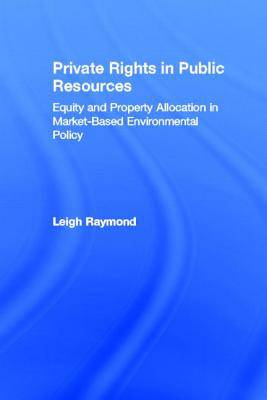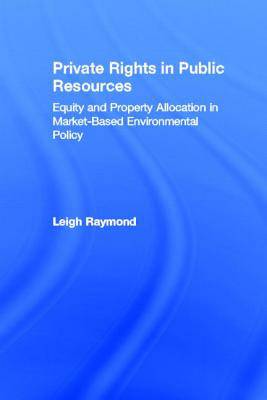
Bedankt voor het vertrouwen het afgelopen jaar! Om jou te bedanken bieden we GRATIS verzending (in België) aan op alles gedurende de hele maand januari.
- Afhalen na 1 uur in een winkel met voorraad
- In januari gratis thuislevering in België
- Ruim aanbod met 7 miljoen producten
Bedankt voor het vertrouwen het afgelopen jaar! Om jou te bedanken bieden we GRATIS verzending (in België) aan op alles gedurende de hele maand januari.
- Afhalen na 1 uur in een winkel met voorraad
- In januari gratis thuislevering in België
- Ruim aanbod met 7 miljoen producten
Zoeken
Private Rights in Public Resources
Equity and Property Allocation in Market-Based Environmental Policy
Leigh Raymond
Hardcover | Engels
€ 305,45
+ 610 punten
Omschrijving
Privatizing public resources by creating stronger property rights, including so-called rights to pollute, is an increasingly popular environmental policy option. While advocates of this type of market-based environmental policy tend to focus on its efficiency and ecological implications, such policies also raise important considerations of equity and distributive justice. Private Rights in Public Resources confronts these ethical implications directly, balancing political theory and philosophy with detailed analysis of the politics surrounding three important policy instruments--the Kyoto Protocol, the 1990 Clean Air Act Amendments, and the 1934 Taylor Grazing Act. Author Leigh Raymond reviews legislative records and administrative documents and interviews key policymakers. Confirming that much of the debate in the selected policies centers on the equity or fairness of the initial allocation of property rights, he applies the theories of John Locke, Morris Cohen, and others to build a framework for identifying the competing norms of equity in play. Raymond's study reveals that, despite the different historical and ecological settings, the political actors struggled to reconcile similar arguments-and were often able to achieve a similar synthesis of conflicting ownership ideas. Rather than offering a familiar argument for or against these policies on ethical grounds, the book explains how ideas about equity help determine a policy's political fate. Shedding light on the complex equity principles used to shape and evaluate these controversial initiatives, this empirical analysis will be of interest to those on all sides of the debate over market-based policies, as well as those interested in the role of normative principles in politics more generally.
Specificaties
Betrokkenen
- Auteur(s):
- Uitgeverij:
Inhoud
- Aantal bladzijden:
- 264
- Taal:
- Engels
Eigenschappen
- Productcode (EAN):
- 9781891853692
- Verschijningsdatum:
- 23/10/2003
- Uitvoering:
- Hardcover
- Formaat:
- Genaaid
- Afmetingen:
- 156 mm x 242 mm
- Gewicht:
- 476 g

Alleen bij Standaard Boekhandel
+ 610 punten op je klantenkaart van Standaard Boekhandel
Beoordelingen
We publiceren alleen reviews die voldoen aan de voorwaarden voor reviews. Bekijk onze voorwaarden voor reviews.









